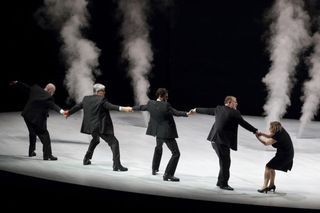|
Back
Dido and Bluebeard! Bedfellows at last Los Angeles
Dorothy Chandler Pavilion
10/25/2014 - & November 2, 6, 9*, 12, 15, 2014
Henry Purcell: Dido and Aeneas, Z. 626
Béla Bartók: Bluebeard’s Castle, Opus 11, sz. 48
Paula Murrihy (Dido), Liam Bonner (Aeneas), Kateryna Kasper (Belinda), John Holiday (Sorceress), Summer Hassan (Second Lady), G. Thomas Allen (First Witch), Darryl Taylor (Second Witch), Brenton Ryan (Sailor)
Robert Hayward (Bluebeard), Claudia Mahnke (Judith)
Los Angeles Opera Chorus, Grant Gershon (chorus master), Los Angeles Opera Orchestra, Steven Sloane (conductor)
Barrie Kosky (production), Ute M. Engelhardt (Associate Director), Katrin Lea Tag (Scenery and Costume Designer), Joachim Klein (Lighting Designer)

(© Craig Matthew/LA Opera)
Henry Purcell’s Dido is a splendid little opera. Barrie Kosky’s Dido is a splendid little theater piece.
Add Australian born, German nurtured director Barrie Kosky to Béla Bartók’s Bluebeard and you have a masterpiece of opera theater.
It is kinky art, where less is more and more is more. Among the kinkier elements were the three witches who foiled Dido’s consuming love for Aeneas — three full figured, bearded, black-American counter tenors who leapt on and off the long bench that traverses the stage hiking up their skirts to expose their hairy legs. It was an astonishing bit of casting by L.A. Opera.
The contemporary 20 maybe 30 something Dido (Irish soprano Paula Murrihy from the Frankfurt Opera) seemed not to have much to say, seated usually at a far edge of the stage-wide bench. Aeneas seemed to be an uninteresting fraternity boy who actually sings quite well (Liam Bonner, L.A. Opera’s recent Billy Budd) who slammed the door (an auditorium exit) when Dido threw him out. Then Dido exclaimed “Remember me, but forget my fate” which was only a prelude to the sobbing and choking she relentlessly continued through and well beyond the end of the famous chorus and the end of the opera (for this final scene the chorus was seated in the pit softly intoning “With drooping wings you cupids come to scatter roses on her tomb”).
Everyone else except Dido and Aeneas were 17th century something, including a naked Adam and Eve, and everyone actually became the music itself, brilliantly effected by director Kosky’s use of abstract physical language — body movement and crowd configuration — that took us from the world we see to a world we create, its meaning dwarfed by its conceit.
And there was much, much more to this famous production from Berlin’s Komische Oper. And when it was all said and done the awed Sunday matinee audience leapt to its feet in genuine appreciation. Did I mention Purcell? Well, he was left in the dust (the orchestra did a wonderful gramophone sliding halt to remind us that Dido and Aeneas is an opera we were quoting, not performing). Conductor Steven Sloane’s committed tempos were those demanded by the Kosky theater piece, not by the Purcell music.
If Dido and Aeneas was frivolous theater, Bluebeard’s Castle was deadly serious opera and deadly serious theater.
Less was seriously more. The stage was nothing more than a huge, tilted white disk that sometimes revolved making it possible to paint a black and white panorama when the front was low, so that we could see the full surface, or when the front was high obliterating the surface, so that we would only see figures, now in stark relief against the black void above. Like close-ups.
Bartók’s little horror opera has only two voices — Bluebeard (Komische Oper baritone Robert Hayward) and his victim Judith (Frankfurt Opera mezzo-soprano Claudia Mahnke). As the story unfolds Mr. Kosky discovers the revelations (opens the doors) by duplicating the Bluebeards — three additional Bluebeards (silent) appear as the doors are opened, and are magically and very simply transformed into Bluebeard’s treasure, force and domain (the three Bluebeards are engulfed in geysers of steam). Already powerfully realized in Bartók’s cannily descriptive music these revelations here crescendoed into a gigantic climax with added brass blasting from the lighting bays on either side of the stage. It was so gigantic that (knowing that Mr. Kosky is fearless when it comes to exploiting ideas) it is possible he even perpetrated the cardinal sin of opera — amplification!
German developed, born in L.A. conductor Steven Sloane participated magnificently in this psycho-drama, extracting music from the score that went well beyond merely descriptive storytelling, finding precise, immense terrors and ecstasies in the sado-masochism that makes Bluebeard’s Castle compelling. The L.A. Opera Orchestra sounded like a real opera orchestra.
This fine, conceptual production comes from Berlin, a city that nurtures the development of stage directors. Sadly, in the U.S. there is no interest in developing American directors. Take a look at the seasons of the important American opera companies. The directors are from Germany and Great Britain, countries that develop talent and do not simply import it.
Michael Milenski
|